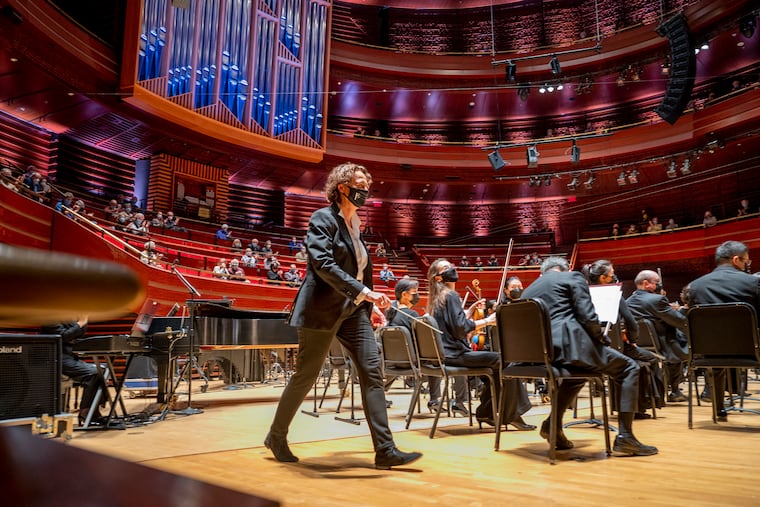She inspired a $3 million donation to the Philly Orchestra. This weekend she’s conducting Tchaikovsky.
French conductor Nathalie Stutzmann leads the Philadelphia Orchestra in Tchaikovsky's “Pathètique” and a Prokofiev concerto.

Nathalie Stutzmann arrived for this week’s Philadelphia Orchestra concerts with an extra little gust at her back. The principal guest conductor chair has been endowed with a $3 million gift, the orchestra announced just before her visit.
More significantly, perhaps, the announcement of the donation — from orchestra-Kimmel Center board co-chair Ralph W. Muller and wife Beth Johnston Muller — included a line noting that the donation was inspired by Stutzmann, and “further signifies the importance of the principal guest conductor to the artistic vision of the orchestra.”
Let’s hope so. Language like this suggests Stutzmann has a role with the orchestra beyond isolated concert dates, and that’s a good thing. The French conductor and contralto views orchestral sound and phrasing through an operatic lens, which, in her concerts here so far, is a sensibility that has melded nicely with the personality of this orchestra.
It’s possible, though, to be bullish on Stutzmann while still recognizing that Thursday night’s concert wasn’t quite what it should have been (or might be by the time this weekend’s repeats roll around). There were moments of greatness in the Tchaikovsky Symphony No. 6 she led. But here and there, her imprint on the piece created the feeling of an artist standing before a slightly unfinished canvas.
I wondered, too, about the guest soloist she brought in. In concerts with the Pittsburgh Symphony Orchestra last week, Stutzmann led the Brahms Violin Concerto with violinist Daniel Lozakovich, and here the pair took on the Prokofiev Violin Concerto No. 2. The young violinist (he’s 21 and looks younger) has benefited from a close relationship with another conductor, Valery Gergiev, now most widely noted for his role as an acolyte of Vladimir Putin.
Lozakovich’s biography on his website says he “maintains a strong artistic partnership” with Gergiev, although perhaps that biography is old. The artist’s bio in the orchestra’s program booklet doesn’t mention Gergiev among the dozen-plus conductors with whom the violinist has performed. Will he perform again with Gergiev? Messages to his London-based management were not answered.
It’s easy to hear why Lozakovich has so quickly risen to the elite realm of top orchestras here and in Europe. He has chops, and his sound has a clarion presence. What I didn’t hear was a strong point of view, some aspect of individuality that reveal who he is and what he thinks of this piece. He reached a certain level of sweetness when, in the first movement, the violinist introduces a Romeo and Juliet-esque theme, and in the second movement Lozakovich walked an impressive tightrope of high notes. But mostly on this night he was a promise unfulfilled.
The orchestra was dotted with substitute players and a few changes in the usual seating. Bassoonists Mark Gigliotti and Holly Blake were standouts among the woodwinds in the Prokofiev; it’s not uncommon for non-principal players to take principal spots in concertos.
But the switch-up continued in the Tchaikovsky Sixth. Associate principal clarinetist Samuel Caviezel’s usual quiet presence was the perfect fit for the sweet, extremely soft solo a few minutes into the first movement. And it was here the performance clicked. The orchestra’s brass were exceptionally fine — razor sharp and penetrating. Stutzmann tried to hold onto silence in the hall in the moment at the end of the triumphant third movement, but it didn’t work; the audience applauded and the lamenting fourth movement had to wait.
Some conductors slow the finale, suggesting a portrait of death. If Stutzmann subscribes to the view, she believes in a death of some momentum, a pulsing struggle whose conclusion, though inevitable, still comes as a gasping surprise.
Additional performance: Saturday at 8 p.m. in Verizon Hall, Broad and Spruce Streets. Tickets are $10-$165. philorch.org, 215-893-1999.